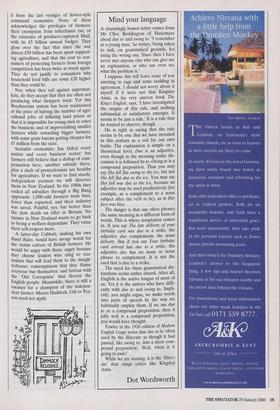Mind your language
A charmingly honest letter comes from Mr Clive Boddington of Haslemere about due to and owing to. 'I remember as a young man,' he writes, 'being taken to task, on grammatical grounds, for using the wrong one. Since then I have never met anyone else who can give me an explanation, or who can even see what the problem is.'
I suppose this will leave some of you snorting in rage and some nodding in agreement. I should not worry about it myself if it were not that Kingsley Awns, in his very uneven book The King's English, says, 'I have investigated the origins of this rule, and nothing substantial or satisfactory emerges. It seems to be just a rule.' It is a rule that he wanted to observe, though.
He is right in saying that the rule seems to be one that we have invented in this century as a rod for our own backs. The explanation is simple on a theoretical level. Due is an adjective, even though in the meaning under dis- cussion it is followed by to. Owing to is a compound preposition. Thus you may say She fell flat owing to the ice, but not She fell flat due to the ice. You may say Her fall was due to the ice, because an adjective may be used predicatively (for example, as a complement to a noun subject after the verb to be), as in Her face was blue.
The danger is that one often phrases the same meaning in a different form of words. This is where temptation comes in. If you say The late delivery of your birthday card was due to a strike, the adjective due complements the noun delivery. But if you say Your birthday card arrived late due to a strike, the adjective due has no noun or noun phrase to complement. It is not the card that is due to a strike.
The need for these grammatical dis- tinctions seems rather absurd. After all, English is the native tongue of most of us. Yet it is the natives who have diffi- culty with due to and owing to. Impli- citly, you might argue, we make words into parts of speech by the way we habitually employ them. If we use due to as a compound preposition, then it jolly well is a compound preposition, you would have thought.
Fowler in the 1926 edition of Modern English Usage notes that due to is 'often used by the illiterate as though it had passed, like owing to, into a mere com- pound preposition'. Well, when is it going to pass? While we are waiting, it is the 'illiter- ate' that stings critics like Kingsley Amis.
Dot Wordsworth


















































































 Previous page
Previous page